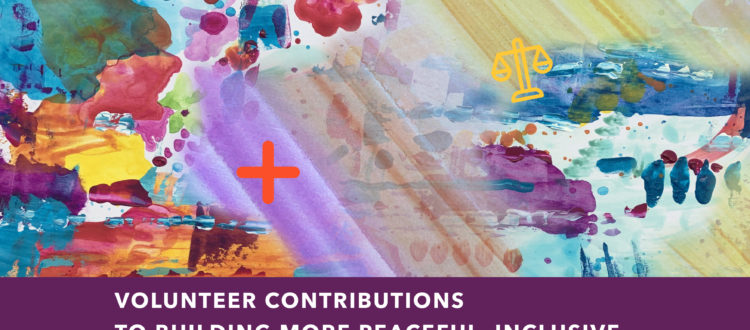Adaptive Framework to identify volunteer contributions to the achievement of SDG16Plus
United Nations Volunteers (UNV) Innovation Challenge Award
The paper “Volunteer contributions to building more peaceful, accountable, inclusive and just societies” was co-produced by Cecilia Milesi and Erika Lopez Franco as awardees of the United Nations Volunteers (UNV) Global Innovation Challenge launched in late 2019.
The challenge aimed to seek innovative ideas for measuring and recognising the economic and social contributions of volunteers, in particular their support for the achievement of the Sustainable Developments Goals (SDGs).
A shorter version of this paper will be published in an anthology with the proposals of the other seven award winners in a format and language adequate for policy audiences. More info: www.unv.org
Paper’s abstract
Today more than ever,1 voluntary actions that contribute to more peaceful, inclusive, just and accountable societies – whether led by the communities, nongovernmental organizations or governments at national and global level – need to be better understood, valued and celebrated. Five years into Agenda 2030, it is time to move from the recognition that peace entails much more than the absence of war or violent conflict, towards understanding the contributions that millions of volunteers and activists make worldwide to sustaining peace – often risking their own lives. These initiatives should be duly recognized and integrated into formal, informal and parallel Sustainable Development Goal (SDG) reporting mechanisms. This paper presents an adaptive framework that non-governmental and government-led volunteering programmes, and most importantly, volunteers and local communities worldwide can use to identify, value, recognize, and celebrate their contributions to building more peaceful, inclusive, just and accountable societies. The adaptive framework integrates principles of the United Nations (UN) Sustaining Peace Agenda, the SDG 16 Plus (SDG16+) targets and indicators, and conceptual elements from Johan Galtung’s “violence triangle” and his framing of “positive peace”2 . These elements are interwoven by a Participatory Action Research (PAR) approach that places citizens at the centre of creating a vision and plan of action for change. The paper also presents evidence and examples of volunteer initiatives helping to build more peaceful, accountable and just societies in relation to the components of the adaptive framework. We situate our proposal within the global political momentum around volunteerism and peace, and the debates around the politics behind generating evidence of impact
Download paper: Paper_Volunteer Contributions_SDG16Plus
About the Authors
Cecilia Milesi is the founder of Global Change Center, a platform to catalyze the emergence of a world of dignity for all. She regularly provides advisory and dialogue facilitation services to organizations around the world working in the human rights, conflict prevention and inclusive development nexus. She is the founder of Subir al Sur, an argentine youth leadership initiative. Cecilia is a sociologist (University of Buenos Aires), with masters in Conflict (University of London). She is Asia Global Fellow (Asia Global Institute) and board Member of Asuntos del Sur, a think-tank promoting policy innovation.
Erika Lopez Franco is an independent facilitator and researcher working with inclusive, power-aware, and participatory approaches to knowledge creation alongside groups with different marginalized identities. She focuses on a variety of themes, including transparency and accountability, social inclusion, civic engagement and volunteerism. She studied International Relations in ITAM (Mexico City) and has an MA in Development Studies at IDS, University of Sussex (UK) but her most valuable lessons have come from working with inspiring organizations, movements and activists in Latin America, Africa and India.
Acknowledgements
We would like to thank UNV for the award and support, in particular Margaret Carroll, UNV Policy Specialist and Christopher Kuoqui, CEO of Zero Poverty Solutions.
Also, we are grateful to Dr. Jo Howard, Participation, Inclusion and Social Change cluster leader at the Institute of Development Studies (IDS, University of Sussex) for peer reviewing this paper.
We strongly appreciate the openness shown by the Coordinating Committee for International Voluntary Service (CCVIS). The team openly shared key information on its research methods as well as emerging data on how volunteers are contributing to building a more just and peaceful world. More information about CCIVS can be found here: https://ccivs.org/
Finally, we would like to thank all the volunteers and activists working across countries, often in extremely difficult circumstances; their hard work and commitment were a source of inspiration for developing this paper.

